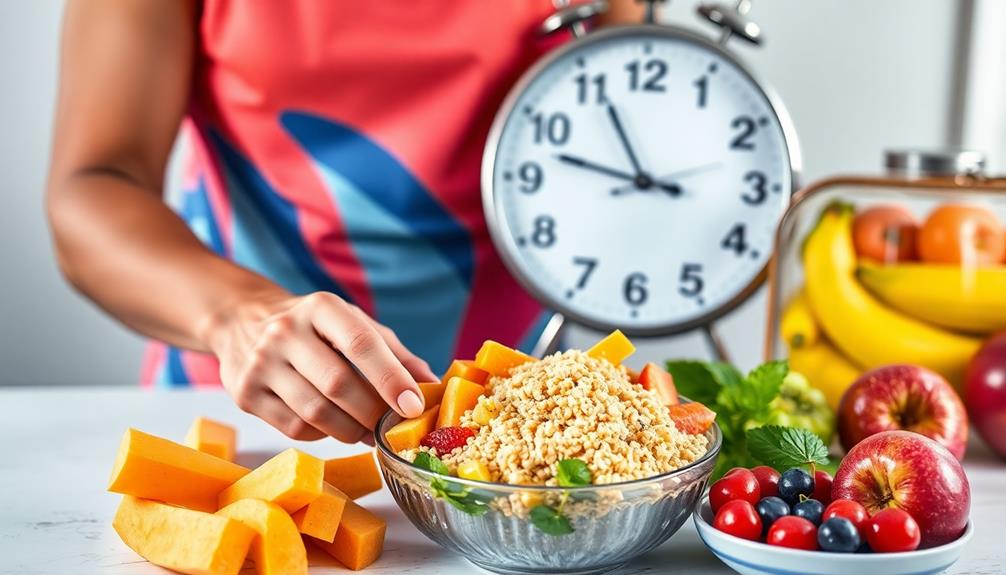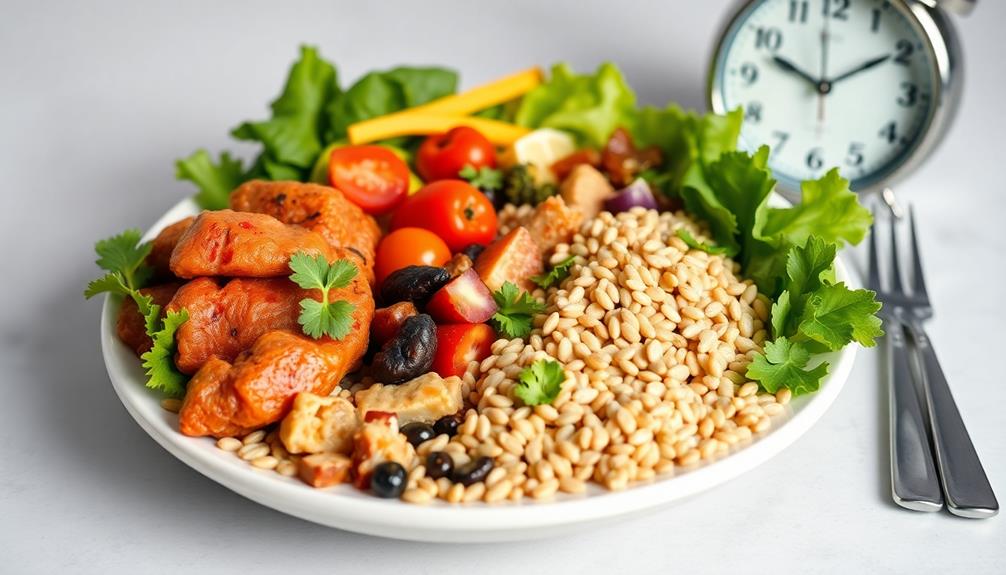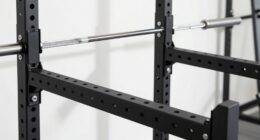Meal timing is crucial for optimal athletic performance and recovery. Consuming meals every 3-4 hours helps to keep your energy levels consistent and ward off fatigue. A pre-exercise meal high in carbohydrates boosts your body’s readiness for physical activity. Aim to consume 30-60 grams of carbohydrates per hour during your workout to maintain endurance. After exercising, it is important to refuel with carbohydrates and protein within 45 minutes to aid in muscle recovery and replenish glycogen stores. Proper management of meal timing can significantly enhance your performance results. There is a wealth of information available on how you can maximize your nutrition for success.
Key Takeaways
- Regular meal timing every 3-4 hours helps maintain energy levels and reduces muscle wastage during intense training.
- Pre-exercise meals rich in carbohydrates enhance performance and focus, especially when consumed 1-4 hours prior to activity.
- Post-exercise nutrition should occur within 30-45 minutes to maximize glycogen restoration and muscle recovery.
- Hydration is crucial; drinking adequate fluids before, during, and after exercise supports peak performance.
- Strategic nutrient timing optimizes energy availability, cognitive function, and recovery for athletes.
Importance of Nutrition for Performance

How essential is nutrition for your athletic performance? It's absolutely fundamental. A balanced intake of carbohydrates, proteins, and healthy fats fuels your body, optimizing both performance and recovery.
Incorporating fresh, seasonal ingredients, like those found in Nettle and Potato Soup, can provide the necessary vitamins and minerals to support your training. Meal timing plays a significant role in how your body utilizes these nutrients. When you eat can directly impact your energy levels, focus, and even cognitive function. For instance, consuming breakfast can improve your attention and memory, which is especially beneficial for student-athletes.
Carbohydrate intake is critical, too. Eating the right amount of carbs before, during, and after exercise maximizes your performance and speeds up recovery. You want to make sure you're not only getting enough nutrients but also timing your meals effectively to support your training and competitions.
Hydration shouldn't be overlooked, either. Regular fluid intake is essential for maintaining peak performance. When you're well-hydrated, your body can train effectively and perform at its best during competitions.
Prioritize your nutrition and meal timing to enhance your athletic performance, and you'll notice the difference in your training and results.
Pre-Exercise Nutrition Guidelines

Proper pre-exercise nutrition is vital for maximizing your athletic performance. To fuel your body effectively, focus on meal timing and carbohydrate intake. Ideally, consume 1 g/kg of carbohydrates 1 hour before exercise and 2 g/kg 2 hours prior. This approach considerably enhances your exercise performance compared to a fasted state.
Incorporating a variety of foods, including those inspired by global cuisines like Brazilian dishes, can also provide unique sources of energy and flavor. If you have more time, aim for larger carbohydrate amounts of 3-4 g/kg when eating 3-4 hours before exercise to achieve the best possible glycogen stores.
When planning your pre-exercise meals, prioritize carbohydrate availability. This will enhance substrate utilization and improve both endurance and overall exercise capacity. For example, dishes such as Cuscuz Paulista can be excellent sources of carbohydrates when prepared with care.
To avoid gastrointestinal distress, stick to small, low-fat, and low-fiber snacks before workouts. Hydration also plays a vital role in your pre-exercise routine. Aim to hydrate with 5-7 mL/kg of water or a sports drink at least 4 hours before exercising to maintain the best performance levels.
Nutrition During Exercise

Maintaining energy during exercise is just as important as pre-exercise nutrition. To enhance your performance, you should aim to consume 30-60 grams of carbohydrates per hour. This intake helps sustain energy levels and delay fatigue, allowing you to push through those challenging moments.
The absorption rate of glucose is about 1 gram per minute, meaning that consuming the maximum of 60 grams per hour is essential to effective fueling. Incorporating nutrient-dense foods like a Loaded Baked Potato can provide not only carbohydrates but also important vitamins and minerals that support overall health.
Start your carbohydrate consumption shortly after beginning your exercise. This proactive approach can greatly improve endurance and help you maintain focus on your goals.
Sports drinks containing 6-8% carbohydrates are ideal during prolonged physical activity, as they provide quick hydration and energy.
Additionally, it's important to monitor your individual sweat rates to adjust both carbohydrate and fluid intake strategies. This personalization guarantees you're not only fueling your body effectively but also staying hydrated, which is crucial for peak performance.
Post-Exercise Recovery Nutrition

After your workout, the essential recovery window kicks in, making nutrition crucial for replenishing your energy stores.
Incorporating dishes like Mushroom Masala can provide essential carbohydrates while also delivering a rich blend of spices that support muscle recovery.
You need to focus on glycogen restoration strategies, primarily through carbohydrates, and don't forget to include protein for peak muscle recovery.
This combination will support your body's repair mechanisms and enhance your overall performance.
Critical Recovery Window
Within the first 45 minutes post-exercise, your body's ability to absorb nutrients peaks, making it a vital recovery window for ideal recovery nutrition. This is the time to focus on your meal timing to maximize post-exercise nutrition.
To effectively restore glycogen levels, you should aim for a carbohydrate intake of 1-1.2 grams per kilogram of body weight. High glycemic index foods, such as those found in Red-Braised Pork Belly, are particularly advantageous in this window, as they facilitate rapid glycogen restoration due to their quick absorption rates.
In addition to carbohydrates, including 15-25 grams of protein in your post-exercise meal can greatly enhance muscle recovery and growth. This combination of nutrients not only replenishes your energy stores but also supports the repair and rebuilding of muscle tissue after intense workouts.
Research shows that aggressive carbohydrate feeding (0.6-1.0 g/kg) within 30 minutes post-exercise can lead to 50% faster glycogen restoration compared to delayed intake.
Glycogen Restoration Strategies
To effectively restore glycogen levels after a workout, you need to implement strategic post-exercise nutrition practices. Focus on meal timing, as consuming carbohydrates soon after exercising is vital for glycogen restoration. Aim for an aggressive carbohydrate intake of 0.6-1.0 g/kg within 30 minutes post-exercise. This can greatly enhance your glycogen levels, especially if you choose high glycemic index foods during the recovery window, typically within 45 minutes.
Incorporating nourishing dishes from diverse culinary traditions, such as Chao (Rice Porridge), can provide the necessary carbohydrates and enhance your recovery experience.
Studies show that consuming 1-1.2 g/kg of carbohydrates in this important recovery period can lead to faster glycogen resynthesis; you can experience up to 50% faster recovery if you ingest a carbohydrate bolus immediately after your workout.
To complement your carbohydrate intake, consider incorporating 15-25 grams of protein in your recovery meal. This won't only aid in muscle recovery but also optimize the benefits of your post-exercise nutrition.
Don't forget that maintaining adequate daily carbohydrate intake of at least 8 g/kg is essential for restoring glycogen levels within 24 hours after intense exercise, supporting your overall performance and recovery.
Protein for Muscle Recovery
Protein plays an essential role in muscle recovery following exercise. Consuming 15-25 grams of protein within 45 minutes post-exercise greatly enhances muscle protein synthesis (MPS) and aids in muscle recovery. Pairing protein with carbohydrates can further optimize your recovery, especially if you consume 1-1.2 grams of carbohydrates per kilogram of body weight within 30 minutes after your workout. This combination not only promotes MPS but also supports glycogen replenishment.
Timing is important; immediate post-exercise protein intake maximizes MPS compared to delayed consumption. Regular protein intake every 3-4 hours around training sessions guarantees you maintain muscle mass and supports recovery processes. Here's a quick overview of key components for effective post-exercise recovery:
| Nutrient | Timing |
|---|---|
| Protein | Within 45 minutes |
| Carbohydrates | Within 30 minutes |
| Regular Intake | Every 3-4 hours |
Incorporating these strategies into your post-exercise nutrition plan can lead to better muscle recovery and improved athletic performance. So, make certain you prioritize both protein and timing in your recovery routine!
Daily Meal Timing Strategies

Establishing a regular meal schedule is essential for athletes aiming to maximize their performance and recovery. By focusing on meal frequency, you can align your nutrition with your training demands. Eating every 3-4 hours helps maintain consistent energy levels, preventing muscle wastage and supporting your body composition goals.
This approach reduces cravings and the likelihood of overeating. Incorporating nutrient-dense foods like Dorayaki (Red Bean Pancake) can provide a sweet energy boost while also satisfying your hunger. Before your training sessions, consume a light pre-training meal rich in carbohydrates. Doing so enhances your performance and boosts energy levels during workouts or competitions.
Additionally, prioritize post-exercise nutrition within a 45-minute window. Aim for 1-1.2 g/kg of carbohydrates to effectively replenish glycogen stores that your muscles need for recovery.
During heavy training periods, frequent meals spaced every 2-3 hours not only facilitate higher energy intake but also improve nutrient delivery for muscle recovery and growth.
Carbohydrate Optimization Techniques

Carbohydrate optimization is vital for athletes looking to enhance their performance and recovery. To achieve this, aim for a daily carbohydrate consumption of 5-12 g/kg, increasing to 8-10 g/kg during intense training to maximize glycogen stores.
Incorporating diverse carbohydrate sources, such as corn-based dishes like Chilaquiles, can provide not only energy but also nutrients beneficial for recovery. During exercise, it's essential to ingest carbohydrates, targeting 30-60 grams per hour to sustain energy levels and exercise capacity. This can be accomplished by consuming a 6-8% carbohydrate solution every 10-12 minutes, which can improve performance by 7-20%.
Implementing carb-loading techniques can further boost your glycogen reserves before endurance events. This involves tapering your training while ramping up carbohydrate intake, ensuring your muscles are primed for peak performance.
Post-exercise, focus on glycogen re-synthesis by consuming 1-1.2 g/kg of carbohydrates within a 45-minute recovery window. High glycemic index foods are particularly effective here, as they facilitate rapid glycogen restoration.
Adjusting your meal frequencies to include these strategies can appreciably impact your overall athletic performance, helping you recover faster and perform at your best. By prioritizing carbohydrate optimization, you set yourself up for success in your training and competitions.
Research on Nutrient Timing

Nutrient timing plays an essential role in maximizing athletic performance and recovery, especially when it comes to carbohydrate and protein intake. Research indicates that your post-exercise carbohydrate intake considerably affects glycogen resynthesis rates. By consuming 0.6-1.0 g/kg of carbohydrates within 30 minutes post-exercise, you can achieve a 50% faster glycogen restoration compared to waiting longer.
For endurance activities, aim for 30-60 grams of carbohydrates per hour, as glucose absorption peaks at about 1 g/minute. Traditional dishes like Muamba De Galinha from Angola provide a rich source of carbohydrates and protein, making them an excellent option for athletes seeking to refuel effectively.
When it comes to protein, timing matters too. Ingesting 20-40 grams of high-quality protein within two hours after exercise can considerably boost muscle protein synthesis (MPS), aiding in recovery and growth. Following a nutrition position stand that emphasizes high-carbohydrate diets—around 8-12 g/kg/day—can help maximize glycogen stores, especially during intense training.
Additionally, strategic meal frequency—consuming smaller, frequent meals—can optimize nutrient delivery and maintain energy levels. This approach is crucial for sustaining performance and ensuring that you're fueling your body adequately throughout your training and recovery periods.
Practical Applications for Athletes

Understanding how to apply the principles of nutrient timing can considerably impact your training outcomes and performance as an athlete.
By maximizing meal frequency and timing, you can enhance muscle recovery and support your overall performance. Incorporating traditional snacks like Kue Putu or Dadar Gulung can provide a delicious source of energy that complements your training regimen.
Here are some practical applications to keep in mind:
- Eat every 3-4 hours to maintain consistent energy levels and reduce fatigue.
- Include 1-4 g/kg of carbohydrates in your pre-exercise meal, consumed about 4 hours prior to competition, to maximize glycogen availability.
- Post-exercise, aim for 1-1.2 g/kg of carbohydrates within 45 minutes to guarantee ideal glycogen replenishment and muscle recovery.
- Incorporate high-quality protein (20-40 g) every 3-4 hours to enhance muscle protein synthesis.
Macronutrient Recommendations

An athlete's success hinges on precise macronutrient intake tailored to their training demands. To optimize athletic performance, you should prioritize your carbohydrate intake, aiming for 8-10 g/kg/day during intense training. This high-carbohydrate diet is essential for maximizing glycogen stores, especially after high-volume workouts. It helps guarantee your energy levels remain high and supports recovery.
In addition to carbs, protein plays a critical role in your nutrition strategy. To effectively stimulate muscle protein synthesis (MPS) and enhance recovery, consume at least 10 g of essential amino acids or a protein bolus of 20-40 g post-exercise. Aim to do this within 2 hours after your workout for the best results.
Spreading your protein intake across the day is also important; try to consume 20-40 g of high-quality protein every 3-4 hours.
Pay attention to meal frequency, as regular intervals help maintain energy levels and support recovery.
With these macronutrient recommendations in mind, you can greatly improve your athletic performance and guarantee your body recovers efficiently from intense training sessions.
Future Directions in Research

As you explore future directions in research on meal timing, consider how emerging nutritional strategies could reshape athletic performance.
Investigating nutrient timing across diverse populations will provide insights that benefit everyone, not just elite athletes.
Emerging Nutritional Strategies
In the quest for ideal athletic performance, emerging nutritional strategies are reshaping how athletes approach meal timing. Research increasingly highlights the significance of nutrient intake, particularly the timing of carbohydrates and proteins, to enhance recovery and improve performance. These strategies emphasize the importance of consuming carbohydrates and proteins immediately after exercise to optimize muscle glycogen replenishment and promote muscle repair. Furthermore, the impact of cooking on protein digestion has become a crucial consideration, as certain cooking methods can enhance the bioavailability of proteins, making them more easily absorbed by the body. As a result, athletes are increasingly mindful of not only what they eat, but also how their food is prepared.
For both endurance and strength athletes, strategic meal timing can make a substantial difference.
Consider these emerging strategies:
- Tailored Nutrient Timing: Individual variations, such as genetic predispositions, can impact how athletes should time their meals for peak results.
- Exploring Fat Intake: Future studies are set to investigate how the timing of fat intake might further enhance athletic performance.
- Broader Applications: Investigations are expanding to include diverse populations, ensuring that nutritional strategies benefit not just athletes but also individuals across various fitness levels.
- Adapting Guidelines: As new evidence emerges, updates to current position stands on nutrient timing will be essential to refine recommendations.
Diverse Population Studies
Emerging nutritional strategies emphasize the importance of meal timing, but understanding its effects across diverse populations is equally significant. Future research should focus on how nutrient timing impacts not just athletes but also women and non-athletic individuals. By exploring these effects, you can gain insights into how different demographics respond to meal timing and its influence on athletic performance and health outcomes.
Additionally, it's important to examine specialized clinical populations, such as those with metabolic disorders, to determine how tailored meal timing can aid in recovery and enhance overall health. Addressing dietary under-reporting in your studies is essential, especially among athletes, to guarantee you accurately capture data on energy intake and meal frequency.
Longitudinal studies will provide valuable information about the long-term impacts of meal timing on both athletic performance and body composition. By investigating psychological and behavioral factors that influence meal timing adherence, you can develop effective nutritional strategies tailored to individual needs.
Ultimately, incorporating diverse populations into your research will lead to a more thorough understanding of how meal timing can optimize health and performance for everyone.
Nutrient Timing Innovations
Looking ahead, researchers are poised to investigate deeper into the nuances of nutrient timing, particularly the strategic timing of fat intake and its effects on athletic performance. This area remains under-researched, and its exploration could greatly impact how athletes optimize their dietary intake. Additionally, understanding nutrient timing may also shed light on how hormonal changes affect metabolism, potentially offering insights into phenomena such as *food cravings during pregnancy*. As research broadens, it could establish tailored guidelines not just for athletes but for other populations experiencing significant physiological changes, such as pregnant individuals. By aligning fat intake with these unique metabolic shifts, the findings might offer more personalized dietary strategies to enhance both performance and overall well-being.
Future studies will likely explore several key aspects:
- The timing of calcium intake and its influence on bone health markers
- The effects of meal frequency on recovery and performance
- The role of carbohydrate timing in maximizing energy levels during training
- Investigating nutrient timing strategies across diverse populations, including women and non-athletic individuals
As research progresses, you'll see a push for more evidence-based guidelines that validate the significance of nutrient timing, especially concerning carbohydrates and fats.
Adaptations to dietary intake strategies could lead to enhanced performance outcomes, making it vital to stay informed about current findings. Continuous updates in the field will guarantee that athletes can leverage the latest insights to fine-tune their nutrition strategies.
Ultimately, understanding nutrient timing innovations will empower you to make informed choices that could elevate your athletic performance.
Frequently Asked Questions
How Does the Timing of Meals Impact an Athlete's Performance?
Meal timing affects your energy levels, focus, and recovery. Eating at ideal times guarantees you've got the right nutrients when you need them most, boosting your performance and helping you feel your best during training.
What Is the Impact of Meal Timing?
Meal timing affects your body's energy levels and recovery. Eating strategically throughout the day helps maintain consistent energy, supports muscle repair, and enhances performance, ensuring you're always ready to train at your best.
How Does Food Affect Athletic Performance?
Food fuels your body, impacting energy levels, endurance, and recovery. Carbohydrates boost glycogen stores, proteins aid muscle repair, and healthy fats support overall health. Eating well lets you perform at your best during training and competition.
Does Meal Timing Matter for Muscle?
Imagine your muscles as hungry engines, craving fuel. Yes, meal timing matters for muscle! Eating protein every few hours turbocharges growth, while carbs post-workout helps your body recover and refuel, keeping those engines running smoothly.
Conclusion
In the grand symphony of athletic performance, meal timing plays a vital note. By understanding how your body's rhythm aligns with nutrition, you can enhance your energy, endurance, and recovery. Remember, every bite you take is a step toward your goals, so don't underestimate the power of timing. As you fine-tune your meal schedule, you're not just fueling your body—you're composing your path to success. Keep experimenting and find what works best for you!









